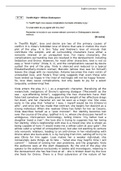English Literature - Revision
In ‘Twelfth Night’, love and desire are two of the primary causes of
conflict. It is Viola’s forbidden love of Orsino that sets in motion the main
plot of the play. It is Sirs Toby and Andrew’s love of misrule that
contribute the subplot, and all surrounding characters have either a
romantic interest or an unrequited love. For many characters, the
complications surrounding love are resolved in the denouement; including
Sebastian and Orsino. However, for most other characters, love is not so
easy a “knot t’untie” (Viola, II, ii), and the complications caused by desire
outlast the end of the play. Viola is silenced and reduced to a typical
Elizabethan/Early-modern woman; Malvolio (whose love was for himself)
leaves the stage with no resolution; Antonio becomes the main victim of
unrequited love, and Feste’s final song suggests that even those who
have ended up happy in the triad of marriages will not be happy forever.
So, love does cause complications, but only leads to joy for a select
(arguably, undeserving) few.
Viola enters the play in I, i, as a pragmatic character, literalising all the
melancholic metaphors of Orsino’s opening dialogue (“Receiveth as the
sea… eye-offending brine”), suggesting the two characters have their
fates tied somehow. As the play goes on the weight of her affections drags
her down, and her character arc can be seen as a tragic one. She vows
early in the play that “whoe’er I woo, I myself would be his [Orsino’s]
wife”, and once she has made that contract, she begins her descent as a
strong individual. When she realises Olivia has fallen for her as Cesario,
Viola describes herself as a “poor monster”. Her identity becomes lost
over the course of the play, typified in II, iv, where she discusses herself in
ambiguous, third-person terminology, telling Orsino “my father had a
daughter loved a man”; the love she is trying to suppress has her losing
her identity. Viola’s relationship with love is a mixed one; she is shown as
being capable of love (“I would make me a willow cabin at your gate”; the
willow cabin a symbol of unrequited love), but also not wanting to venture
into romantic relations, leading to an anti-climax in her relationship with
Orsino when she buck-ends II, iv by hurrying from him, setting off to try to
woo Olivia for him again. Love makes her a weaker individual; she
increasingly puts things up to fate – “what else may hap/To time I will
commit” – instead of solving her own problems, and the pragmatic Viola
the audience sees at the start disappears. By the end of the play she
speaks to the audience exclusively in asides and monologues, meaning in
the denouement she has few lines at all – she is broken down by the love
she feels for Orsino. There is a final subversion of the nature of her




